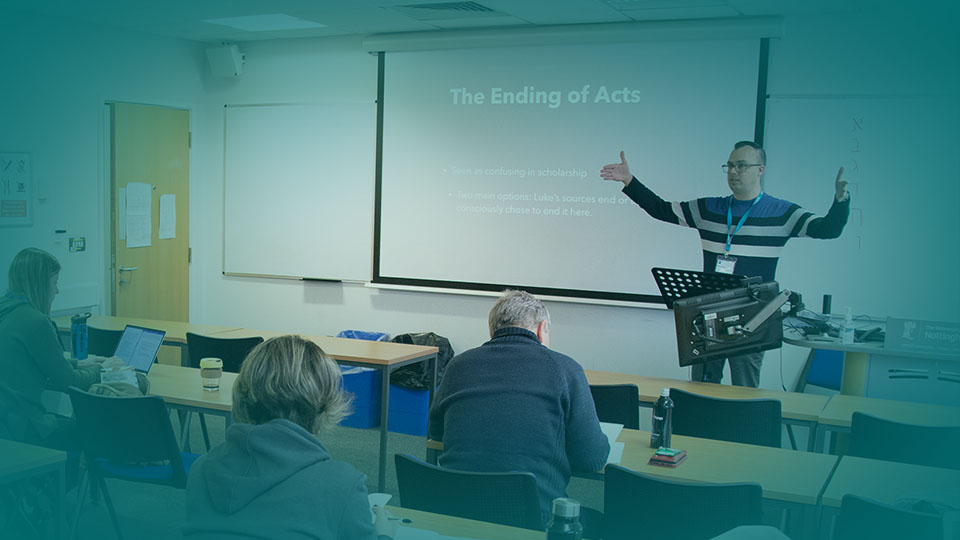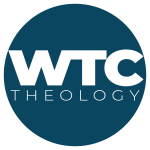FLEXI-MA
KINGDOM THEOLOGY
The MASTERS programme (with taught modules taken over two or three years) is designed for students who already have a bachelor’s degree in theology and/or religious studies (at 2:1 or higher), or who have completed a Graduate Diploma in theology and/or religious studies (with an average mark of 60% or higher).

The Flexi-MA option is for those needing a flexible and dynamic MA programme, but are unable to join WTC’s local Hub communities.
See all our Hub Locations HERE.
Flexi-MA in Kingdom Theology
Flexi-MA students who are not within easy travelling distance of an existing Hub will need to ensure that they can access a decent academic theological library, or have the personal resources to purchase books that will be required for research at this level. All students have access to an extensive online database of journal articles and e-books.
Both Flexi-MA and Hub-based students have access to Faculty throughout the year via email as well as access to resources that lecturers post online via Moodle (WTC’s virtual learning environment for students).
This programme is validated by Birmingham Newman University.
Applications are now OPEN.
Please contact us if you are interested or have any queries: 0300 040 6200 / info@wtctheology.org.uk.
PROGRAMME CONTENT*
The programme content options are the same for students on both the Hub-based and Flexi-MA tracks. Both tracks get the best of the live teaching with the rest of the MA learning community, twice yearly for 4-5 day Residentials in early September and January. For Hub-based MA students the non-Residential teaching is delivered on two or three Saturdays either at in their chosen Hub or students may opt to join online. Flexi-MA students join online to receive this teaching. You watch the teaching videos, liaise with your tutor via email or video conferencing, and write your assignments according to your schedule.
This module provides you with an opportunity to reflect on the significance of the Old Testament as Christian Scripture, with attention to key challenges and opportunities that the Old Testament presents for those in Christian ministry and mission. This course will provide opportunities to consider the costly loss of the Old Testament in modern church life. Students will explore the key ethical challenges to recovering the Old Testament in the modern world (gender, violence, ethnocentrism, historicity), and various ways that the Old Testament might be recovered for personal and church enrichment.
In this module students will examine the historical background and theological emphases within the narrative and literary settings of Luke-Acts. Close readings that engage with notable scholarship will utilise selected pericopes to illustrate intersections between history, theology and spirituality in the Lukan corpus. Throughout the study, attention will be given to the spiritual implications of Luke’s theology, and the significance of the Spirit as a subject in Luke-Acts. A critical question underlying this module is: How does Luke-Acts as a historical and literary narrative offer a clear trajectory to Christian theological formation and spiritual development?
In this module students will explore how early Christians understood their place in history and began to tell that story. The story includes a wild plot twist: the persecuted minority becomes the triumphant empire. In this module, students will explore this shift through the work of the early church historian Eusebius of Caesarea who witnessed it firsthand. They will read ancient texts and learn how to navigate the age of Constantine, a period of great political, ecclesiological, and theological change. Students will gain a critical understanding of the historical and theological context of the first five centuries of Christianity and understand the distinctiveness of early Christian historiography over its pagan predecessors and counterparts.
This module explores the development of the doctrine of God from the Patristic Era right through to the current day. Several authors will take centre stage in this enterprise, most notably Augustine of Hippo, Anselm of Canterbury, Richard of St Victor, Thomas Aquinas, John Calvin, Karl Barth, and Katherine Sonderegger. In light of the theologies of these thinkers, the students will be invited to critically reflect on the motivations that led to these theologies being developed, on the context in which they did, and how those ideas relate to their own conceptions of God. What is the relation between the Creator and His creation? How do we understand the unit of God? How does God’s activity relate to His eternal being? How can we speak helpfully about Him? These are just a few of the questions that will be discussed.
This module provides you with the opportunity to step further in to the life of the Spirit as we explore Paul’s theological vision for the world. To gain a window on his theology, we will focus on Romans and 1 Corinthians to see how he applied his theology to these contexts – addressing things like cultural immersion, ecclesial divisions, sexual ethics, and ministry gifting – so that we can embody that theology in our contemporary contexts. The module will give particular attention to the Spirit’s role in Paul’s theology and how the people of the Spirit live eschatologically. This will all be framed in the context of shaping our lives and contemporary ministries in light of Paul’s enduring theology.
This module explores and critically assesses concepts and issues in Christian ethics with a biblical and theological focus. It introduces the subject of ethics more broadly before examining the particular task of Christian ethics as an academic discipline enabling Christians to live lives worthy of their calling in faithful discipleship and witness as part of Christian mission.
This module will teach you to read both biblical Greek and Hebrew.
All students on the MA will need to complete a dissertation.
The dissertation (usually completed in Year 3) gives students the opportunity to explore their own theological interests, and if they choose, to undertake a sustained study in some aspect of social transformation or marketplace theology. Students select a dissertation topic in conjunction with tutors and will pursue guided, but largely independent, research.
*WTC reserves the right to change modules in line with the terms and conditions of the Student Contract. Any changes will be aligned with delivering a qualification at this level in Kingdom Theology.
You can also study individual MA Modules HERE!
PROGRAMME DELIVERY
The taught modules can either be taken over two years (3 modules per year) or three years (2 modules per year). In addition to the two Residential teaching weeks, students who are on the Flexi-MA do not attend the Teaching Saturdays, but receive a recording of the teaching after the event. Please see the MA programme page for details of the Teaching Saturdays.
OPTION 1:
Taught modules taken over 2 Years
+ Dissertation in third year
YEAR 1:
- – Luke and Acts
- – Reading the Old Testament for the Church
- – Theology, Culture, and Politics in Early Christianity
YEAR 2:
- – Paul and the Spirit
- – Choose either:
– Christian Ethics for Discipleship and Witness or
– Introduction to Biblical Languages - – God through the Ages
YEAR 3:
- – Dissertation
OPTION 2:
Taught modules taken over 3 Years
+ Dissertation in fourth year
YEAR 1:
- – Reading the Old Testament for the Church
- – Theology, Culture, and Politics in Early Christianity
YEAR 2:
- – Luke and Acts
- – Choose either:
– Christian Ethics for Discipleship and Witness or
– Introduction to Biblical Languages
YEAR 3:
- – Paul and the Spirit
- – God through the Ages
YEAR 4:
- – Dissertation
- 19 October 2024
– Paul and the Spirit with Prof Ben Blackwell (10am-4pm) - 9 November 2024
– Biblical Languages: Greek with Prof Jason Myers (1-7pm) - 1 February 2025
– Reading the Old Testament for the Church with Dr Freddy Hedley (10am-4pm)
– Faithfully Performing the Biblical Drama with Rev Dr Andrew Goddard (10am-4pm) - 15 March 2025
– Theology, Culture, and Politics in Early Christianity with Dr Amy Brown Hughes (1-7pm)
– God through the Ages with Dr Jasper Knecht (1-7pm)
NOTE: There is no Teaching Saturday for Luke and Acts with Prof Jason Myers.
FAQ
Yes. Flexi-MA students will participate in occasional online hangouts with lecturers as well as being given the opportunity to connect with other students via private social media groups. In addition, WTC provides a number of Kingdom Theology Events throughout the UK each year, at which students can connect in person.
ENTRY REQUIREMENTS
A Bachelor’s degree in theology and/or religious studies (preferably at 2:1 or higher) or a Graduate Diploma in theology and/or religious studies (preferably with an average mark of 60% or higher).
If English is not your first language, please see the English Language requirements on the Admissions page.
- All students have access to the study skills resources and learning development support we provide at this level.
FEES
OPTION 1 – Two year (taught element) programme:
£4,150 per year, which includes a £400 non-refundable deposit to confirm your place after receiving an offer, plus a dissertation fee (£850 for academic year 2024-5). Please see details in Facts About Fees – link below.
OPTION 2 – Three year (taught element) programme:
£2,950 per year for the first two years. Fees will increase in the third year (by not more than 10%). For info on the dissertation fee (£850 for academic year 2024-5). Please see details in Facts About Fees – link below.
Applications are now OPEN.
Please contact us if you are interested or have any queries: 0300 040 6200 / info@wtctheology.org.uk.
Concerned about finance?
Our friends Stewardship may be able to help you to raise your financial support. The Partner Account for Individuals will help you manage your financial support for living costs and personal ministry expenses in one place. You’ll get a range of tools to manage your support, connect with your supporters and develop a team of ministry partners. Find out more here.
PARTNERING WITH THE CHURCH TO
EQUIP AND SEND THE WHOLE PEOPLE OF GOD
connect with us on
LIFE-GIVING THEOLOGY
Come Find The Programme That Best Suits You
WTC THEOLOGY
© 2024 WTC (Reg. No. 6506007)
WTC is a Registered Charity (No. 1123573)
reCAPTCHA (v3) is active on this site
Click HERE for WTC’s Privacy Notice
Click HERE for WTC’s Cookie Policy


